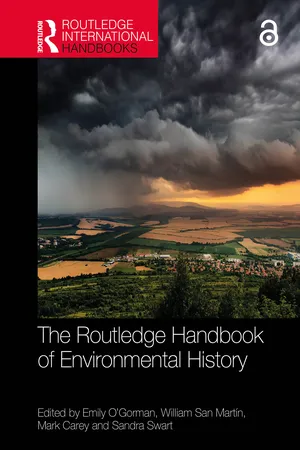
The Routledge Handbook of Environmental History
- English
- ePUB (mobile friendly)
- Available on iOS & Android
The Routledge Handbook of Environmental History
About this book
The Routledge Handbook of Environmental History presents a cutting-edge overview of the dynamic and ever-expanding field of environmental history. It addresses recent transformations in the field and responses to shifting scholarly, political, and environmental landscapes.
The handbook fully and critically engages with recent exciting changes, contextualizes them within longer-term shifts in the field, and charts potential new directions for study. It focuses on five key areas:
- Theories and concepts related to changing considerations of social justice, including postcolonial, antiracist, and feminist approaches, and the field's growing emphasis on multiple human voices and agencies.
- The roles of non-humans and the more-than-human in the telling of environmental histories, from animals and plants to insects as vectors of disease and the influences of water and ice, the changing theoretical approaches and the influence of concepts in related areas such as animal and discard studies.
- How changes in theories and concepts are shaping methods in environmental history and shifting approaches to traditional sources like archives and oral histories as well as experiments by practitioners with new methods and sources.
- Responses to a range of current complex problems, such as climate change, and how environmental historians can best help mitigate and resolve these problems.
- Diverse ways in which environmental historians disseminate their research within and beyond academia, including new modes of research dissemination, teaching, and engagements with stakeholders and the policy arena.
This is an important resource for environmental historians, researchers and students in the related fields of political ecology, environmental studies, natural resources management and environmental planning.
Chapters 9, 10 and 26 of this book are freely available as a downloadable Open Access PDF at http://www.taylorfrancis.com under a Creative Commons Attribution-Non Commercial-No Derivatives (CC-BY-NC-ND) 4.0 license.
Frequently asked questions
- Essential is ideal for learners and professionals who enjoy exploring a wide range of subjects. Access the Essential Library with 800,000+ trusted titles and best-sellers across business, personal growth, and the humanities. Includes unlimited reading time and Standard Read Aloud voice.
- Complete: Perfect for advanced learners and researchers needing full, unrestricted access. Unlock 1.4M+ books across hundreds of subjects, including academic and specialized titles. The Complete Plan also includes advanced features like Premium Read Aloud and Research Assistant.
Please note we cannot support devices running on iOS 13 and Android 7 or earlier. Learn more about using the app.
Information
Table of contents
- Cover Page
- Half Title page
- Title Page
- Copyright Page
- Contents
- Illustrations
- Contributors
- Acknowledgements
- Introduction: Framing environmental history today and for the future
- Part I New Methods, Innovative Approaches
- Part II Non-Human Agencies
- Part III Engaging with the Planetary and the Anthropocene
- Part IV Power, Flows, and Knowledges
- Part V Practices and Actions for Current Socio-Ecological Crises
- Index